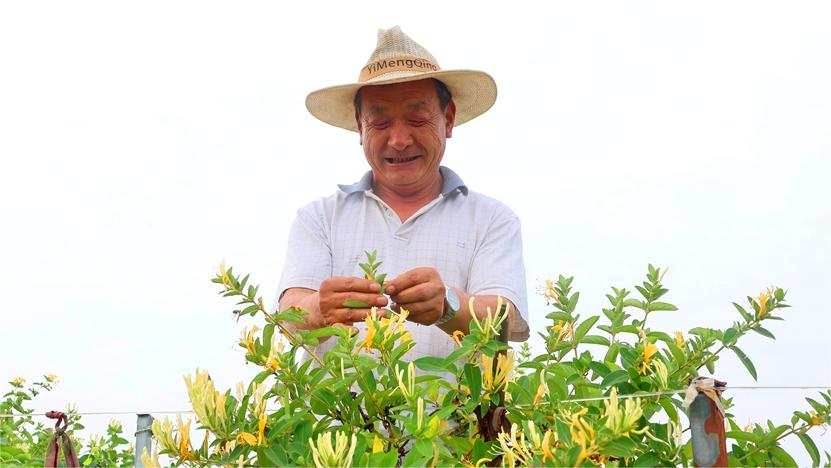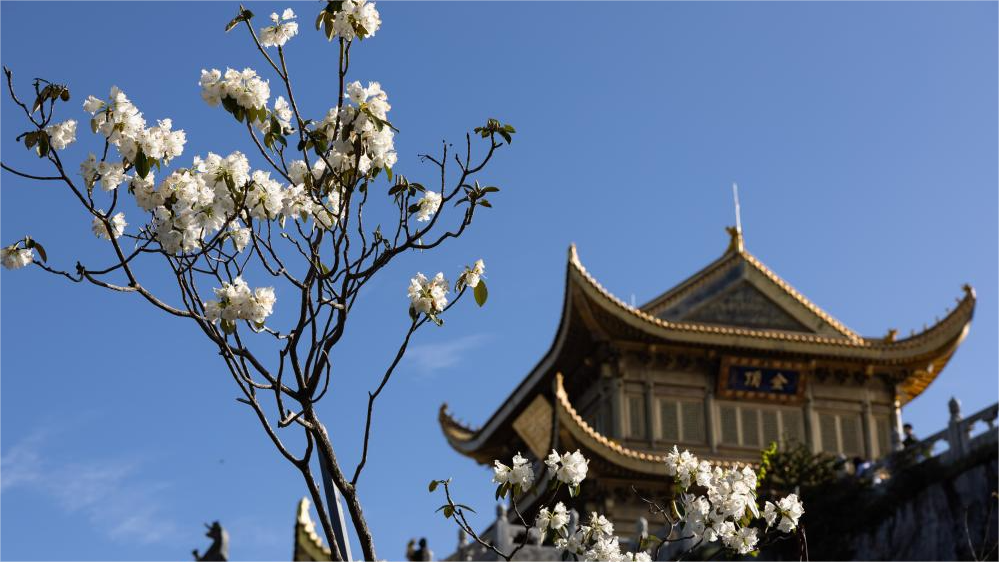Shared passion for delicacies fuels China-EU agricultural trade
BEIJING/BRUSSELS, May 29 (Xinhua) -- From Bordeaux wines and Iberico ham to Comté cheese and Sitia olive oil, these signature agri-products from the European Union (EU) have gained a greater presence in the kitchens of Chinese families, tickling Chinese taste buds with their exotic flavors.
Every one of these products are labeled with Geographical Indications (GI) designation, a mark of authenticity and quality endorsed by both the EU and China, making them sought-after products in the Chinese market.
China and the EU inked an agreement on geographical indications in 2021, aiming to improve bilateral trade of agri-food products. This year marks the third anniversary of the landmark agreement coming into effect.
The first GI list, which entered into force in 2021, protects 100 Chinese agricultural GIs in the EU and 96 agricultural EU GIs in China. A second list of more products from both sides will be protected as of March 1, 2025.
"In a broader sense, GIs contribute to enhancing EU-China relations, by bringing us closer through our mutual love for food," EU Commissioner for Agriculture Janusz Wojciechowski said in an exclusive interview with Xinhua.

This photo taken on March 23, 2022 shows a general view of the distillery at Remy Martin house in Cognac, southwestern France. (Xinhua/Gao Jing)
WINES AND HAM
Commenting at a recently concluded roundtable forum on China-EU Geographical Indications held in Belgium's Brussels, Wojciechowski said the agreement is mutually beneficial, promoting agricultural trade between the two regions and positively impacting regional economic development.
He led a delegation of European businesses on a visit to China in April this year, during which they met with Chinese government officials and discussed collaboration concerning agricultural matters, including the GI agreement.
This delegation of 75 business leaders represented EU agri-food companies and organizations from all over Europe, he said. "It is the largest delegation I have taken with me during my time as commissioner, representing the strong interest of EU agri-food businesses in the Chinese market."
In 2023, the total agri-food trade exchange value between the EU and China was close to 23 billion euros (about 25 billion U.S. dollars), according to Wojciechowski. These robust agricultural trade ties have bred business opportunities for GI producers.
A listed GI Jumilla, which signifies wine produced in southeastern Spain, specifically within the Murcia province, serves as one example, according to Lorenzo Abellan, chairman of Bodegas Carchelo, S. L., a family winery that produces Jumilla wines.
"There are over 40 wineries in the entire Jumilla wine region, and total exports to China, our fourth-largest market globally, stood at between 6 million and 8 million bottles last year, a notable expansion from around 4.5 million bottles in 2021," Abellan said.
Wang Cheng, the general manager of Shandong Anxunman Trading Co., Ltd., acting as the commercial representative for Bodegas Carchelo in China, concurred that the increased exposure resulting from the GI designation has led to new business opportunities.

A chef prepares 5J Cinco Jotas iberico ham at the unveiling ceremony of LA LISTE 2024 world restaurant ranking at the French Ministry of Foreign Affairs in Paris, France, Nov. 20, 2023. (Xinhua/Gao Jing)
Taking another GI, Dehesa de Extremadura, which denotes a distinct region in Spain renowned for its production of premium Iberico ham, as an example, Wang said his company's sales of such Iberico ham in China is expected to record a five-fold increase in 2024 compared with 2023, as many restaurants in first-tier cities are joining his list of clients keen on this rural delicacy.
China has a rich culinary tradition and heritage similar to that of the EU, Wojciechowski said. "We see that protecting GIs is a 'win-win' concept. Our producers, our consumers, and our society as a whole reap the benefits."
HERITAGE, LANDSCAPE VALUED
With breathtaking vistas featuring lush forests, deep valleys, and cascading waterfalls, Jingmai Mountain, which is situated in the city of Pu'er in Yunnan Province in southwest China, hosts a Chinese GI designated Pu'er tea, a type of fermented tea that is renowned worldwide for its exquisite fragrance.
Home to communities of well-preserved ancient tea trees, the mountain's local history of human cultivation of tea trees can be traced back more than 1,000 years.

An aerial drone photo taken on Aug. 30, 2023 shows shacks built for tea drying at Mangjing Village in Pu'er City, southwest China's Yunnan Province. (Xinhua/Li He)
"In Europe, Chinese teas evoke in the minds of consumers an image of beautiful tea plantations such as Jingmai Mountain," Wojciechowski said.
Both Europe and China are dotted with landscapes influenced by GIs that contribute to the renown of their regions, he remarked, also citing the vineyards in France and the rolling hills in Tuscany as examples.
However, to earn its label, each GI product must respect detailed requirements and specific standards, according to Wojciechowski.
Jingmai Mountain has served as such an example, maintaining its great biodiversity while supporting human settlements and tree cultivation. Village regulations and local constitutions help prevent tea farmers from applying chemical fertilizers or pesticides to the ancient tea forests. Instead, they have adopted natural methods of preventing plant diseases and pests in these tea forests, such as planting camphor trees to repel insects.
Through the respect of their specifications, GIs ensure the preservation of landscape, according to Wojciechowski.
ROSY FUTURE
Since the beginning of this year, there have been frequent high-level exchanges between China and Europe, fostering closer ties in various fields, especially in the agricultural sector.
In May, China's customs authority greenlighted the entry of more types of agricultural products from Europe into the Chinese market, including pork from the Netherlands, prunes and fresh blueberries from Serbia, and fresh cherries from Hungary, on condition that these products meet China's quarantine and health requirements.
During the same month, China and France issued a joint statement on agricultural exchanges and cooperation, pledging that the two countries will work to expand French pork exports to China, and provide guarantees for market access and safety of poultry products.
Over the years, agri-food products have become an important area of China-Europe economic and trade cooperation.

Visitors take photos of exhibits at the China International Conference for the Cooperation on the Premium Geographical Indication Brands 2023 in Tangshan, north China's Hebei Province, Oct. 24, 2023. (Photo by Wang Zhitong/Xinhua)
Pan Feng, vice chairman of the China-Europe Association for Technical and Economic Cooperation, told Xinhua after the roundtable forum that the promotion of GIs will not only extend product convenience, but also enhance mutual trust in China-EU economic and trade development.
In 2023, the EU was China's second-largest source of imports and second-largest export market, according to a recent report from the China Council for the Promotion of International Trade.
Wojciechowski shares Pan's optimism regarding the future prospects of China-EU trade. "The GI agreement is a sign to the world of both parties' commitment to deeper trade relations, and a symbol of our openness and our adherence to international rules as a basis for trade relations," he said.
"For us, we are just at the beginning of deeper long-term cooperation," Wojciechowski added.
Photos
Related Stories
- China, EU to work together to enhance stability of China-EU ties
- Xi, Macron hold talks, calling for upholding independence
- Xi says China ready to join EU for more broad-based peace conference on Palestinian-Israeli conflict
- Macron says EU refuses logic of decoupling, welcomes Chinese investment
- Von der Leyen says good ties with China important for EU
- Xi says China-EU cooperation is complementary, mutually beneficial in essence
- Sound China-EU cooperation indispensable to world's prosperity
Copyright © 2024 People's Daily Online. All Rights Reserved.









